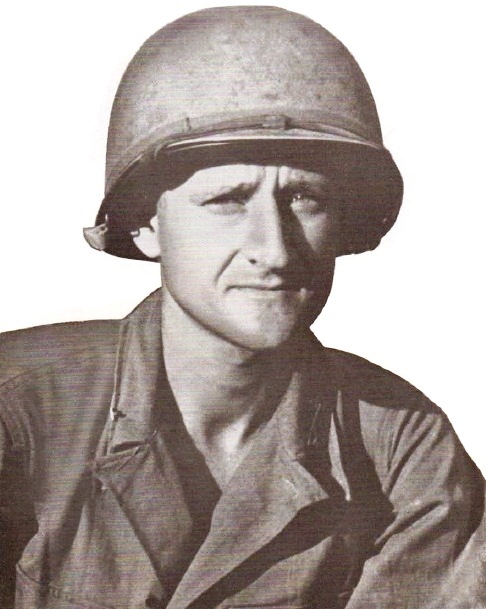|
(There follows the account of one man's life and death in the Hosi Valley. The man was Texas Lieutenant Jack Knight, commander of a troop of cavalry in the Mars Task Force. A skilled soldier and a man of valor, he might well have been a Briton or an Indian, a Gurkha or a Chinese, one of the many who have done their job and gone down doing it. Here is the story.)
Supported by Mars artillery, mortar, and heavy machine-gun fire from Chinese troops, a troop of the 124th Cavalry led by 1st Lieutenant Jack Knight jumped off for their objective (later named Knight Hill) at 0620 the morning of 2nd February.
The barrage made it possible for Knight and his troop to move 1,500 yards through the dense jungle of the Hosi Valley and then up a 250-foot slope toward the objective.
They met only two Japs on the way. Knight killed them both with his carbine. Thirty-five minutes after the jump-off, Knight and his troop had reached their objective and radioed the new position back to Regimental Command Post. The men started digging in while Knight set off to investigate a slope at the end of the hill and as he reached the crest, he spotted a cleverly-concealed Jap pillbox and grenaded it. He found two more pillboxes and grenaded both of them. He called back to his men, "Come on up. There's a whole nest of them down here."
Under Intense Fire
Knight's troop had deployed up the hill under intense Jap mortar, howitzer, and Namboo machine-gun fire, augmented by deadly 70 mm whiz-bangs which explode before they can be heard in flight.
There had been casualties on the way up. Yet as Knight moved over the crest and down the slope on the other side he saw his men running up the slope. He found himself in the center of a horseshoe formation of pillboxes. He threw a grenade into another pillbox, his fourth, then fired his carbine into the opening. A Jap tossed a grenade at Knight from his pillbox. The Lieutenant backed away and waited for it to explode. When it did, shrapnel caught him full in the face. As he turned around and walked back to get more carbine ammunition, the men saw blood dripping down his face.
A Jap tried to bayonet Knight as he walked past a pillbox. A trooper killed him. Knight took more ammunition and started forward again. As he broke into a run, he muttered to another officer, "I can't see."
The rest of the troop had caught up with him now. As they did, Japs in the pillbox horseshoe concentrated their fire. Men were falling all around him. Knight paused just long enough to regroup the squads by arm motions, then with a cry of "Come on, we've got the bastards now," he was out in front of the troop again.
He grenaded another pillbox and was wounded for a second time when a Jap grenade landed close by and exploded. This time he went down but Knight kept shouting encouragement to his men as he lay there. Curtis Knight saw his brother fall and ran forward to lead the troop. He yelled "Jack's hit," took a few paces forward and was dropped by a bullet that passed through him underneath the heart. Lieutenant Knight, injured and unable to move, saw Curtis go down. He asked one of the men to get his brother back to the aid station.
Propped on one elbow, he motioned his men forward again, yelling words of advice and encouragement to them as they passed him. Then on his hands and knees he started to crawl toward another pillbox, his sixth. His forward motion ceased suddenly. His body sagged and lay still. A bullet had done what two grenades had failed to do.
Several hours later, after mopping-up operations were completed and the men safely dug in at their new positions, native litter bearers carried his body down the hill. Curtis Knight had already been flown out to a field hospital.
|
“Finest Example of Valor”
Colonel William F. Osborne, Commander of Knight's regiment, an ex-Marauder who served in the North Burma Campaign as well as on Bataan early in the war, said this when he heard of Knight's death: "In more than four years of combat, I have seen many officers fight and die but Knight's action in leading his troop to their objective against strong enemy concentrations is to me the finest example of courage, valor, and leadership of any officer I have ever had under my command. What Knight did that day is something for every American to be proud of. It is officers of Jack's caliber, and the troops that follow his kind of leadership, that are winning the war, not colonels and generals."
One man in his troop said this: "Jack killed more Japs than any person in the Mars Task Force. I counted at least 15 Japs dead in the pillboxes he worked on. We are just sorry he tried to do so much alone. But we'll remember him every time we go into action. You just don't forget people like Jack."

|
FOR HIS ACTIONS IN THE BATTLE, JACK L. KNIGHT WAS POSTHUMOUSLY AWARDED THE MEDAL OF HONOR.
THIS WAS THE ONLY MEDAL OF HONOR AWARDED IN THE CHINA-BURMA-INDIA THEATER.
THE STRATEGIC HILL WAS NAMED IN HIS HONOR.
ABOUT THIS PAGE
SEND COMMENTS
THE CBI THEATER
Internet adaptation Copyright © 2018 Carl Warren Weidenburner. All rights reserved.

